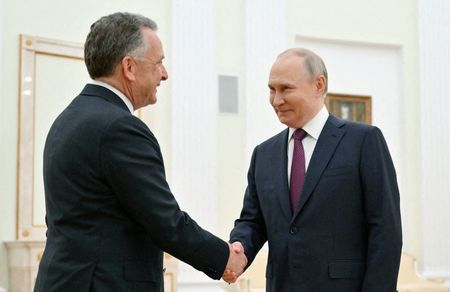By Daria Sito-Sucic
SARAJEVO (Reuters) -Bosnia’s election commission on Wednesday removed the separatist Bosnian Serb president from office after an appeals court upheld a verdict jailing him for a year and banning him from political activity for six years.
The commission’s decision against Milorad Dodik, who immediately rejected it, would take effect after an appeals period expires. An early election for president of post-war Bosnia’s autonomous Serb region would then be called within 90 days, commission member Suad Arnautovic told reporters.
The Russian-backed Dodik previously dismissed his conviction and sentencing in February by a Bosnian state court to a year in jail and six-year ban from politics. He said he would stay in post as long as Bosnian Serb lawmakers backed him and vowed to seek help from both Moscow and U.S. President Donald Trump.
At a press conference on Wednesday, Dodik said the commission’s decision was unacceptable because it violated the Serb Republic constitution and he announced a referendum on whether he should leave office or not.
“If I accept their decision, I accept to violate the constitution and let down the Serb people,” said Dodik, who blamed Bosnia’s post-war international peace overseer Christian Schmidt and “Muslims” (Bosniaks) for the verdict.
Nationalist Serb Republic (RS) officials do not recognise Schmidt, a former German government minister, as High Representative in Bosnia, saying his appointment was not endorsed by the U.N. Security Council.
NO SURRENDER, DODIK SAYS
The RS government also dismissed the sentence and political ban, and Dodik’s SNSD party invited the opposition to join it in the formation of a national unity government.
“Surrender is not an option,” Dodik, who was re-elected in 2022, said on his X profile after the electoral commission’s decision.
It was unclear whether his legal team would appeal against the commission’s decision.
Leaders of Serbia, Russia and Hungary – who all back Dodik – also dismissed the jail term and ban, saying they were politically motivated.
Dodik, who has long advocated RS secession from Bosnia, was sentenced for defying decisions of the Constitutional Court and High Representative Schmidt, whose mandate is to prevent multi-ethnic Bosnia sliding back into civil war.
Dodik has seen through the passage of separatist laws in the RS parliament that were later temporarily suspended by the Constitutional Court. He also ignored a summons by state prosecutors, who then issued an arrest warrant for him.
Bosnia is now suffering its worst political crisis since the 1992-95 war, which killed around 100,000 people. The 1995 Dayton peace treaty divided Bosnia into autonomous Serb and Bosniak-Croat federal entities with a weak central government.
(Reporting by Daria Sito-Sucic; editing by Mark Heinrich)











